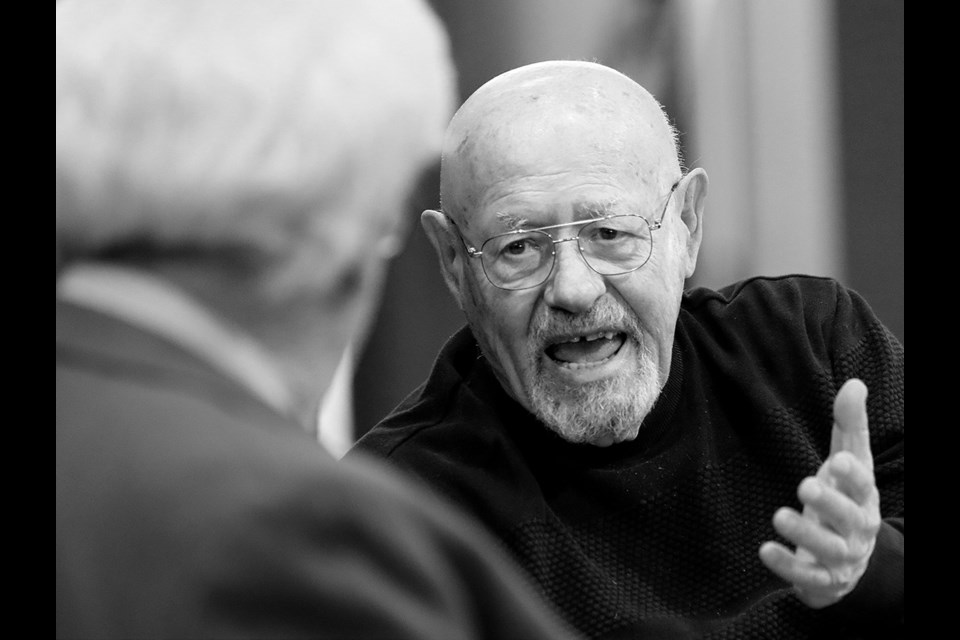Even at 85, Janos Benisz thinks about his dad every day.
His father, a highly decorated soldier who fought for the Austro–Hungarian Army in the First World War, did everything he could to protect his wife, mother and son when the Nazis invaded Hungary in the spring of 1944.
Theirs was one of about 60 Jewish families living in a small town outside of Budapest when the SS guards came knocking, placing a yellow Star of David on their home and dehumanizing them.
At the time, Benisz was six years old and, shortly after the murder of his father and grandmother, was deported with his step-mother to a concentration camp called Strasshauf in Austria.
This morning, Nov. 1, before hundreds of Coquitlam high school students from Dr. Charles Best, Pinetree and Centennial secondaries, Benisz described the horrors he witnessed and suffered for nine months in the camp.
“I was always scared, every day,” Benisz said at the 14th annual Holocaust symposium that was organized by Best teacher Ken Ipe. “My mother’s fears were transported onto me.”
Benisz, who may have been the only child at the labour camp, spoke about sleeping on a concrete floor, not having enough to eat and having to wait until dark to use the restroom so he could avoid penalties and perhaps death. His step-mother slowly went mad, he said.
And his trauma was so ingrained that he remembered little after being freed: His association and thievery with Roma children before being placed by his uncle in a Jewish orphanage in Budapest for two years.
In his talk at the Coquitlam Alliance Church that was organized by the Vancouver Holocaust Education Centre, Benisz showed a black and white image of his family that was snapped in 1928 — a decade before he was born.
He was the only relative to survive the genocide. “I got lucky,” he said.
Benisz also recalled the winter of 1948 when, after six months in France, he and other Jewish orphans were put on a boat for eight days, landing in Halifax.
There, they were greeted with a wool HBC blanket and sweets. “I thought, ‘I’m going to love this country.’”
After growing up in seven “shitty” foster homes in and around Winnipeg, Benisz turned to professional boxing, where he said he worked out his “revenge” in the ring and with the skipping rope and bag.
Later, he plied his trade in journalism. At the Vancouver Sun and other newspapers, he interviewed sports legends such as Cassius Clay (aka Muhammad Ali); Maurice “Rocket” Richard; and Gordie Howe. He also met NDP pioneers Tommy Douglas and David Lewis.
Asked by Holocaust educator Kit Krieger if he considered himself a survivor, Benisz said, “never.”
Asked why he continues to tell his story since immigrating to Canada 75 years ago, Benisz responded, “There is a lot of anti-semitism out there. If I can make one of our kids change our lives for the better, I will have been very pleased.”
Holocaust Education
Benisz’s talk, which was followed by a candle lighting ceremony, came two days after the provincial government mandated Holocaust education for B.C. high school students — starting in the 2025–26 academic year.
It also came about a month after Hamas attacked Israel and as incidents of anti-semitism are on the rise around the world.
Coquitlam–Maillardville MLA Selina Robinson told the crowd about how frightening it is to be a Jew today when Jewish businesses are being boycotted and Jew hate is common.
“It feels surreal,” she said. “I say to myself, ‘This cannot be happening.”
She challenged the students attending to not be silent and to stand up to hate.
Krieger invoked the name of former US president Donald Trump, saying he “legitimized racism,” and took aim at critics who deny six million Jews were murdered during the Holocaust — about two-thirds of the Jewish population in Europe (about 10 per cent of Jewish children survived).
“The Holocaust is the most well-documented genocide in history,” Krieger said. “The fact is that the world failed to come to the rescue of the Jews and there’s fear that it may happen again.”





